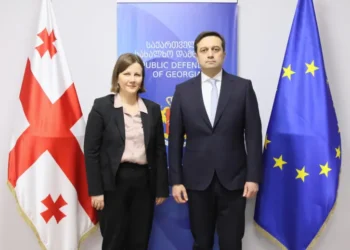Foreign policy has never been a linear endeavor, and one could always read in the visible or hidden movements of its creation the successful or unsuccessful operation of a complex mechanism. As the system of international relations has evolved, this mechanism has become increasingly complex and comprehensive. Its effective utilization, along with direct costs, has required the use of many new types of resources that many countries and actors have to draw upon along the way.
Current Realities
In real time, this practical “training course” has been supplemented by the fact that today the clear line between white and black has been erased, the previously known “extremes” have shifted towards each other, the absoluteness of assessments and even more so, action, has become somewhere useless, and somewhere directly risky.
This disruption in global order produced a “disorderly order” in which one or another predetermined grand strategy led to narrowness and crudeness in navigating the outer course. At the same time, paving the way for one’s own interests in a world order “without planning,” and even partially ensuring one’s own security, places a particularly heavy burden on small countries.
The fate of small countries has not been easy before. However, in our time, this fate is further aggravated by such realities as the declining role of international law, ignoring the reputation factor in the implementation of the agreements reached for reconciliation and harmonization of the interests of global or regional actors, subordination of these interests to one big “trade exchange”, and “delicate” violation of declared principles or ideals by the needs of “trade”.
These and a number of other reasons led to the adoption of qualitatively new approaches as official policy. For example, the so-called Balancing Policy was actually introduced in the foreign arena, the relevance of which is increasing against the background of the war in Ukraine and other military conflicts. Such balancing, or, to put it differently, maneuvering, in the absence of clear lines and rules of the game in the system (or in the systemlessness) of international relations, is associated if not with the full protection of national interests, then at least with their temporary preservation.
Moreover, the so-called practice of balancing, which should by no means be unquestionably equated with unprincipledness, has become part of the geopolitical handwriting not only of small and medium-sized countries, but also of large ones. At the current stage of policy creation, the existing methods of minimizing threats and realizing one’s own interests are constantly changing: both their form and content are undergoing modifications. Thus, for example, the emergence of the phenomenon of the so-called Swing State should be attributed to the type of content changes. Let us now temporarily set aside the question of its etymology and correct Georgian definition. The main point is still the essence, according to which a country (especially a small and medium-sized one) should pursue a rational policy of such quality that would create prerequisites for taking into account the national interest of this country by major geopolitical centers or, at least, avoiding encroachments on it.
Perhaps for some it is controversial, but we would still say that given the created realities, even large countries are not always known for a direct foreign policy line, despite their declared principles. Moreover, if we take the example of the United States of America, this global player is clearly trying to solve the problems of a particular given at the expense of situational partnerships with democratic, hybrid or autocratic regimes. It is also worth noting that such a situational partnership, driven by necessity, is openly permissible for the US national security strategy and, in a sense, gives the aforementioned Swing State connotation to this country’s foreign policy.
In connection with the above, the article published in the January issue of this year of the authoritative magazine Foreign Affairs by William Burns, Head of the Central Intelligence Agency of the United States of America, is significant. Discussing a number of issues, Burns points to the growing demand for hedging (i.e., balancing) by “middle ground” countries. The influential US diplomat and senior intelligence officer emphasizes that whether democracies or autocracies, developed or developing economies, they all exhibit a growing tendency to “diversify relationships to maximize choices.” Moreover, he recognizes that “few benefits and many risks” come from “monogamous geopolitical relations” (i.e. exclusive relations with one particular country – definition by the author of this article) and notes that “geopolitically ‘open’ status” may become more acceptable to countries. We believe that after citing these considerations, our reasoning that we develop in this article will be taken adequately and will be spared from attaching toxic clichés and hackneyed labels.
In short, where modern international politics for large or medium-sized countries means moving along a risky trajectory of endless discoveries and surprises, the situation is exceptionally opposite for small countries that have no special political, economic and financial, military or lobbying resources to advocate for their own national interests.
And the purpose of this article is to talk about the peculiarities of creation and realization of Georgia’s foreign policy taking into account the mentioned circumstances and contradictions, as well as to point out some practical considerations that will make our efforts more effective and realistic. In other words, this is an open and non-reverential discussion of the contours and prospects of a newly understood Georgian foreign policy, the so-called “Georgian Path”.
Introduction for Better Context
Before concretizing and formulating the principles of upgrading our foreign policy (and not only) line, let us also remind ourselves and the readers of some contextual issues:
Let us start with the banal postulate that geography has been, is and will remain an essential determinant of Georgia’s foreign policy making. It is quite enough to mention the all too popular connotations of “geopolitics” and “geo-economics” alone.
We have mentioned geography, and whether we like it or not (“idealists” and “internationalists” will be very much against this opinion), the division of geopolitical geographies into so-called “spheres of influence” or “zones of interest” will remain relevant for the foreseeable future. In this respect, the main concern of countries caught between “zones” and “spheres” will probably be reducing the harmful impact on them, hedging (reinsuring) their interests in the conditions of opposing influences, and optimizing the available opportunities for their own security.
In addition, we should keep in mind the even more prominent place of regionalism and regional geopolitical hubs in the system of international relations. Accordingly, we need to be able to implement the two-frequency institutionalization of Georgia’s foreign policy more instrumentally and without excessive emotionality, namely: (a) the steadiness of the Euro-Atlantic integration course determined by the constitutional order of the country, and (b) constant observation, measurement and appropriate response to regional processes, especially against the background of the complex processes of the South Caucasus and the wider Black Sea region.
While integration into European and Euro-Atlantic structures is a reinsurance of Georgia’s systemic security foundations, Georgia’s regional policy should proactively serve to minimize and prevent situational risks “near and around us”.
And finally: In the conditions of geopolitical “trade”, so-called transactional politics, the priority task of Georgia’s foreign policy remains that we somehow manage to prevent the “misappropriation” of our country’s interests behind our back. This task will become much more difficult in the wake of the gradual strengthening of radical-extremist and populist-isolationist tendencies among our strategic partners – the United States and the European Union. Accordingly, the call: “No decisions and negotiations on Georgia without Georgia (!)”, will become realistically possible only through maximum mobilization of our own national resources, consolidation of intellectual potential of modern standard in a nonpartisan and depoliticized environment.
On the Upgraded Fundamentals, in Short and to the Point
Georgian foreign policy handwriting has gone through several stages of formation. In our opinion, the characteristics of each stage were influenced by the following factors: (a) the situation inside and outside the country at a particular stage; (b) the characterization of a particular top political figure of the country and his personal outlook; (c) personal and professional qualities of a particular head (leadership) of the foreign affairs agency and (d) the real role of the foreign affairs agency and the efficiency factor in shaping the country’s foreign policy. The latter factor is all the more important because under the conditions of weak institutional development of the Georgian state, the functionality of this agency was not always organized in a way that is characteristic of a well-functioning system of governance. Unfortunately, with the country’s political elite failing to properly recognize the importance of a self-sufficient and meritocratic foreign diplomatic institution, and this institution lacking the strength, courage and resources to properly establish itself in response to current and future challenges, the problem still exists today.
To be continued in next week’s GT.
Analysis by Victor Kipiani, Geocase Chairman














